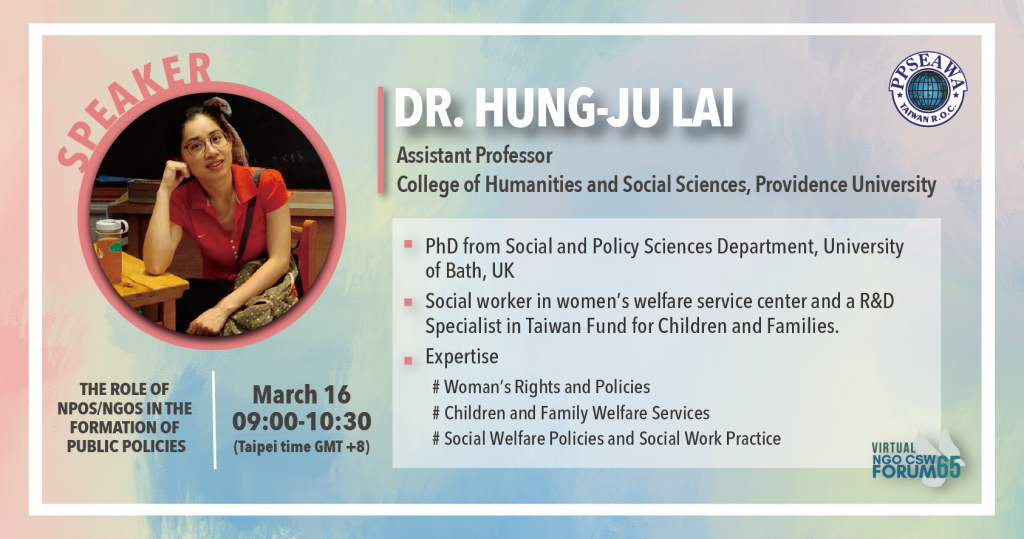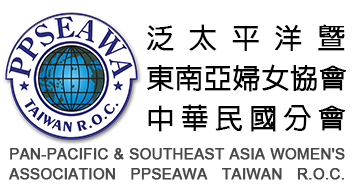Dr. Hung-ju Lai 賴紅汝

Dr. Hung-Ju Lai is the Assistant Professor of the College of Humanities and Social Sciences at Providence University. Her interest in women’s rights and gender policy in Taiwanese context began when she became a social worker at a women’s welfare center. Her interest remained even after she completed her PhD. During the conference she shared her observations of NPOs and NGOs through a Taiwanese point of view.
She began by discussing how the nature of gender is personal, but it is also public to an extent. When talking about the nature of gender it is important to take into account the difference between the two sexes for social and cultural reasons. It is also important to acknowledge the fact that women face oppression from various aspects whether it is within their families in their personal lives, or outside in their public lives. For this to become better, change must start at the public sector, which includes politics. Dr. Lai talked about the book Gender Politics, by Klein published in 1984, in which three stages of gender consciousness are acknowledged. She also talked about Peggy McIntosh who came to Taiwan in 1985 and shared the concept of how the feminist movement might grow in Taiwan.
There are certain things that are required to be able to run a women’s organization. These include beliefs and ideologies, leadership and the physical organization of the NGO, and finally networking with other parties. One of the purposes as to why NGOs and NPOs do this is to be able to create change within the state or government. The Political Opportunity Structure must be open and valuable for the strategies to succeed. According to Dr. Lai NGOs and NPOs usually pick more than one issue to work on and from various fields. However, these issues can be seen from two perspectives, one is gender politics and the other sexual politics. The Gender Politics discuss work and employment, education, participation in politics, and properties. The Sexual Politics discusses refusing to be objectified and gaining autonomy regarding childbirth, coupling, and sexuality. Some issues are also interconnected globally. NGOs and NPOs should not try to avoid globalization as working together towards a specific goal is better.
Dr. Lai then reviewed the development of the feminist movement in Taiwan from the last decades. The feminist movement in Taiwan began during the 70s, only amongst the middle class in the Northern part of Taiwan. During the 1980s NGOs began working towards the goal but they had to abide by the patriarchal mentality. In the 90s NGOs worked towards making allies and helping out on multiple issues. In the 2000s women that were a part of the movement entered the government as consultants. Through her process, Dr. Lai has come up with three key findings, the process for creating space for conversation to policy formation, the mission of the NGOs versus the controversial issues, and the collaboration with other NGOs, or the state. Dr. Lai picked a relevant issue to explain the key findings, working rights for women. The general obstacles that are presented include doing unpaid domestic work, they must remain single if they want to keep their jobs as getting married means childbirth which leads to them leaving their jobs, low-pay, amongst others. NGOs can help out by speaking to the media and drawing attention to the issue, creating space for conversation. NGOs tackle different issues, but they also attack issues in different ways. An example given by Dr. Lai is abortion. Abortion can be dealt with differently depending on the type of NGO handling the issue. The solution may depend on whether the NGO is religious and conservative or progressive feminist. When tackling these issues, the NGOs are also forming and breaking necessary alliances when they choose an issue and where their position. Dr. Lai mentioned how, when talking about child prostitution progressive NGOs and the more conservative ones stood in the same ground, which formed an alliance in that topic, while their different views on abortion broke the alliance regarding that topic. The same goes for marriage rights and gay marriage. Some alliances may break due to different standpoints, in some cases even becoming opponents.
Dr. Lai also talked about the NGOs within the public sector. Some NGOs are considered elite or executive because of their participation with the public sector by forming what is called a participatory democracy of scholars, NGOs, and public officials. Dr. Lai talked about how in the new century we have to ask whether gender has become equal or not and if there have been any improvements that allow us to move to a new phase. There are also new challenges to take into account when thinking of a new phase that would have to be included. Dr. Lai concludes with an overview of focuses that NGOs could apply to improve their strengths. These included asking what stage the NGO is at, what beliefs they support, what issues they’re aiming to discuss, and who the NGO is willing to form an alliance with.
